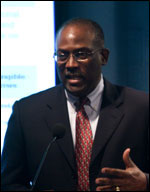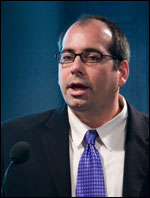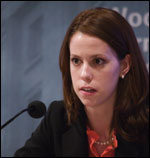The Power of Partnerships: Universities, Businesses, and Excellent STEM Teaching
Among the speakers are: Brian Fitzgerald, Executive Director, Business-Higher Education Forum; Gerald McElvy, President, ExxonMobil Foundation; Mary Ann Rankin, Dean, College of Natural Sciences, University of Texas at Austin; Patrick Callahan, Executive Director, Science and Mathematics Initiative, Office of the President, University of California; Daniel Fallon, Director, Program in Higher Education, Carnegie Corporation; Robert Floden, Co-Director, Teachers for a New Era, and Professor, College of Education, Michigan State University; Joan Ferrini-Mundy, Co-Director, Teachers for a New Era, and Associate Dean/Director, Division of Science and Mathematics Education, Michigan State University; R. David Bynum, Director, Center for Science and Mathematics Education, and Professor, Stony Brook University; Karen Stiner, Albert Einstein Distinguished Educator Fellow, U.S. Department of Energy; Chaired and moderated by: Kent Hughes, Director, Program on Science, Technology, America, and the Global Economy, Woodrow Wilson Center
Overview
Science and math teachers have significant opportunities and challenges in the classroom – preparing students for the globalizing world, handling diversity and closing the achievement gap, incorporating technology into learning, and inspiring young people through discovery and innovation. Ultimately, their work shapes students' minds, and, in turn, the future of our American citizenry and workforce.
Businesses and university leaders are taking a closer look at investing in strong teaching, especially in the fields of science, technology, engineering, and mathematics (STEM). A conference held at the Woodrow Wilson Center on Tuesday, May 6, 2008, with a corresponding event on Capitol Hill the following day, hosted several university, private sector, and government representatives to discuss new initiatives in teacher education. Present to make remarks were former and current House Science and Technology Committee members: former Chairman Sherwood L. Boehlert and current Chair of the Research and Science Education Subcommittee Brian Baird. The Wilson Center extends a special thanks to the speakers and to the Petrie Foundation for making the conference possible.
Kent Hughes, director of the Program on Science, Technology, America, and the Global Economy (STAGE) at the Wilson Center, opened the program. He emphasized the STAGE and Wilson Center commitment to the topic of STEM education and then spelled out the focus of the day: "how pragmatic partnerships, involving business, government, universities, and other institutions, can have a very positive impact on preparing teachers for STEM subjects when they are all pulling in the right direction."
Hughes then introduced keynote speaker Brian Fitzgerald, executive director of the Business-Higher Education Forum (BHEF). The BHEF brings together prominent CEOs and university leaders in order to promote educational excellence, which leads to economic strength. Hughes noted that, in the 1980s, the organization produced the first serious report on U.S. competitiveness.

Brian Fitzgerald emphasized that for the future of STEM education, the "quality of math and science teaching is the single most important factor." One BHEF report, An American Imperative: Transforming the Recruitment, Retention, and Renewal of Our Nation's Mathematics and Science Teaching Workforce, makes clear recommendations to address teacher under-preparedness and high attrition rates. Fitzgerald explained that we need to improve content and pedagogy courses in teacher education and address job dissatisfaction through the "creation and maintenance of learning communities" for teachers to network with one another and continue their professional development.
One BHEF program, the STEM initiative, is working to create a "community of practitioners and researchers" to improve teaching in individual localities. Fitzgerald stressed that there are "two different worlds" – suburban schools and urban schools – with urban students being much less prepared. An important focus, then, is to better align curriculum, adequately train teachers, and raise expectations. William Swanson, co-chair of the initiative and CEO of Raytheon, has developed a systems-dynamic model for STEM education, which demonstrates the complexity of all the factors that contribute to student success – with "teachers at the heart of it."
The work called for by the BHEF – including stronger teacher preparation and life-long community support for teachers – is already being advanced by innovative teacher education programs and organizations across the United States.

Gerald McElvy, president of the ExxonMobil Foundation, spoke at the Wilson Center and on Capitol Hill about the foundation's involvement in education and its $125 million commitment to the National Math and Science Initiative (NMSI), which is pushing strong university teacher education. Mentioning the Rising Above the Gathering Storm report, he explained that the shortcomings of the U.S. education system make up a "quiet" crisis, because it takes time and understanding to demonstrate how drastically America's poor education performance will affect future innovation and long-term U.S. competitiveness. In response to this crisis, NMSI has been established with the goal of expanding the Advanced Placement (AP) course program and duplicating "proven-effective" teacher education programs nationwide. Its model is the UTeach program of the University of Texas at Austin, which has had ten years of evident success. Currently, NMSI supports 13 UTeach-type programs across the country, and hopes to increase that number to 55 in the next five years – leading to 5,000 new teachers. McElvy stressed that appropriations under the America Competes Act, along with the commitment of state education authorities, will be "very important" in helping these effective teacher education programs to grow further.
Why was UTeach chosen as an excellent example of teacher education? Mary Ann Rankin, dean of the College of Natural Sciences at the University of Texas, Austin, described the program's innovative components and achievements.  Because research university students tend to be discouraged from teaching, UTeach attracts students by offering the first two courses tuition-free – courses that actually allow them to try teaching in the classroom. Further, the program has several key elements: offering field experience at every level, aggressively recruiting students, and making it possible for students to complete the program along with other fields of study in just four years. Perhaps most importantly, the program has been built by a combination of master teachers from the College of Natural Sciences, the College of Education, and local high school math and science teachers. Together, they have developed strong pedagogy and content courses that reflect modern knowledge of how students learn best.
Because research university students tend to be discouraged from teaching, UTeach attracts students by offering the first two courses tuition-free – courses that actually allow them to try teaching in the classroom. Further, the program has several key elements: offering field experience at every level, aggressively recruiting students, and making it possible for students to complete the program along with other fields of study in just four years. Perhaps most importantly, the program has been built by a combination of master teachers from the College of Natural Sciences, the College of Education, and local high school math and science teachers. Together, they have developed strong pedagogy and content courses that reflect modern knowledge of how students learn best.
Ultimately, over 85% of UTeach graduates become teachers, 70% of them are still teaching five years later, and about half of them teach in schools where a majority of students receive a free or reduced-price lunch. Rankin noted that success in duplicating the program will come from maintaining all of the UTeach key ingredients and encouraging the colleges of sciences to take a leading role in improving teacher education.
California research universities are likewise focusing on improving teacher preparation, a few of them receiving NMSI grants. Patrick Callahan is the executive director of the Science and Mathematics Initiative (SMI) or "CalTeach," which is a University of California (UC) system-wide program supported by Governor Schwarzenegger and California industry that also has plans to involve the California State Universities (CSU) in the future. Callahan explained that California, with 10% of the nation's students, has a significant interest in improving teaching. According to Callahan, part of the solution to the lack of qualified teachers is "changing the culture."  He explained that most people think students have no interest in teaching, but, in fact, the UC Berkeley branch of CalTeach received 100 student applications just after its start. Callahan emphasized that students of science and math are motivated to teach when they see other students struggling with the subjects or when they remember some of their own teachers that didn't succeed in inspiring them. The SMI program encourages students to teach by offering field and research experiences, networking opportunities, and financial incentives. It also has a strong commitment to self-evaluation and data collection, surveying both its participating students and its local mentor teachers. Ultimately, it hopes to increase the number of future teachers graduating from the UC system from 250 to 1,000.
He explained that most people think students have no interest in teaching, but, in fact, the UC Berkeley branch of CalTeach received 100 student applications just after its start. Callahan emphasized that students of science and math are motivated to teach when they see other students struggling with the subjects or when they remember some of their own teachers that didn't succeed in inspiring them. The SMI program encourages students to teach by offering field and research experiences, networking opportunities, and financial incentives. It also has a strong commitment to self-evaluation and data collection, surveying both its participating students and its local mentor teachers. Ultimately, it hopes to increase the number of future teachers graduating from the UC system from 250 to 1,000.
Other programs across the country are focused specifically on enhancing the quality of teacher education at universities already well-known for their excellent approach. The Carnegie Corporation has spearheaded an initiative called Teachers for a New Era (TNE), which was represented at the Wilson Center conference by Robert Floden, a professor of teacher education at Michigan State University (MSU), and Joan Ferrini-Mundy, the associate dean of the Division of Science and Mathematics Education at MSU and currently the director of the National Science Foundation's Division of Research on Learning in Formal and Informal Settings (DRL), who together co-chair the TNE program at MSU. The nationwide program, they explained, emphasizes three main principles at its participating universities: making decisions based on sound evidence, fostering engagement of the arts and sciences in teacher education, and supporting teaching as a profession. The program involves grants to eleven universities, one being MSU, which alone produces about 75 secondary and 300 elementary school teachers each year.
Floden explained that MSU faculty members from the College of Education and the College of Natural Science have always worked together, but are doing so even more now. As teams, they have studied teaching methods and looked at the importance of developing student reasoning skills, leading to stronger content and pedagogy courses. Ferrini-Mundy added that the teams have developed "teacher knowledge standards," which emphasize that teachers should know the origins of mathematical concepts, use visuals and representation methods in class, and focus on the applications of mathematics. The teaching program at MSU is also very concerned with gathering useful evidence – it studies international comparisons in teaching methods, collects data on the content knowledge of their graduating teachers, and is hoping to work with the state to develop better data on the connection between teacher performance and student success.
R. David Bynum, a professor and director of the Center for Science and Mathematics Education at Stony Brook University, discussed some similar programs taking place at his own university on a smaller scale. Without a school of education, the university has found innovative ways to help prepare our nation's teachers. It focuses on building a network within the local community, bringing together current teachers, pre-teachers, community colleges, and university faculty and students. It serves that network by offering teaching labs, workshops, fellowships for pre-service teachers, and master's degrees – all geared to the needs of area teachers. The National Institute of Health, the National Science Foundation, and the Petrie Foundation have all helped to support Stony Brook's strong teacher development initiatives.
In addition to these university programs working to prepare excellent future teachers, there are also several innovative initiatives focused on supporting teachers already in the classroom.
The first to be presented at the Wilson Center conference was the Triangle Coalition for Science and Technology Education, which is a coalition of members from the worlds of business, education, and scientific and engineering societies. Executive director Vance Ablott pointed out that most people underestimate the difficulties of teaching, thinking the solution to low educational performance is as simple as "if the teachers did a better job, the students would learn better." The Triangle Coalition, on the other hand, recognizes the complexities of education and student learning. It brings together teachers and other key stakeholders in education to focus on "providing a common view of where education is going." It helps organize the Energy Department's yearly Albert Einstein Distinguished Educator Fellowship Program for outstanding teachers to work with policymakers in Washington, sponsors conferences year-round, and works closely with the Department of Energy, Congress, and White House offices, among other policymaking bodies.

Following Ablott's presentation, Karen Stiner, a middle school teacher and an Albert Einstein Distinguished Educator Fellow working with the Department of Energy, discussed the details of the Department of Energy Workforce Development for Teachers and Scientists. It sponsors two main teacher professional development programs: the Pre-Service Teachers (PST) Program and the Academies Creating Teacher Scientists (ACTS) Program. The former, PST, is a ten-week summer opportunity for future teachers to work in a National Laboratory, giving them both added content knowledge and a firm grasp of hands-on learning to augment their education. The ACTS program, on the other hand, allows current teachers to do research in a National Laboratory for four to eight weeks during the summer as a three-year commitment. The program gives them the opportunity to collaborate continually with both an experienced "master" teacher and a scientist mentor.
Yet another program supporting current teachers is the American Society of Engineering Education (ASEE). Kristen Farole, the K12 Coordinator for the ASEE EngineeringK12 Center,  explained that ASEE members include 80% of engineering universities and colleges in the country. Its EngineeringK12 Center is essential for teachers looking for education resources, new technology, and networks for correspondence with other teachers. In fact, Teachengineering.org provides free engineering curriculum modules for teachers and a new tool called "Engineering, Go For It!" allows teachers to show students how engineering jobs can address global challenges, to be published in fall 2009. The K12 Center also holds technology workshops attended by about 200 teachers annually.
explained that ASEE members include 80% of engineering universities and colleges in the country. Its EngineeringK12 Center is essential for teachers looking for education resources, new technology, and networks for correspondence with other teachers. In fact, Teachengineering.org provides free engineering curriculum modules for teachers and a new tool called "Engineering, Go For It!" allows teachers to show students how engineering jobs can address global challenges, to be published in fall 2009. The K12 Center also holds technology workshops attended by about 200 teachers annually.
These strong universities, businesses, and other institutions represented at the Wilson Center event are leading the way in working together for the future of STEM education, especially by supporting the teachers that are instrumental to its success.
As a concluding emphasis on the importance of STEM education for the future of our country, Sherwood Boehlert, who served in the U.S. House of Representatives for twenty-four years, six of them as the Chairman of the Science and Technology Committee, shared his own experiences and perspective. In introducing him, Kent Hughes noted that he has also served as a public policy scholar at the Wilson Center.
The United States "has a monumental challenge on its hands – that is not being adequately addressed," said Boehlert.  He spoke not of the Iraq War or the current state of the economy, but rather of the future of STEM education and its importance for our competitiveness in the world. He listed the low rankings of United States students on international assessments, the call that U.S. companies are making for more qualified engineers, and the fact that many U.S. teachers in STEM subjects do not have degrees in either math or science.
He spoke not of the Iraq War or the current state of the economy, but rather of the future of STEM education and its importance for our competitiveness in the world. He listed the low rankings of United States students on international assessments, the call that U.S. companies are making for more qualified engineers, and the fact that many U.S. teachers in STEM subjects do not have degrees in either math or science.
Speaking of his time on the House Science and Technology Committee, Boehlert discussed his work with the National Academies, which led to the "history-making" report, Rising Above the Gathering Storm, and his meetings with former Director of the Office of Management and Budget (current White House Chief of Staff) Josh Bolten to outline the need for a significant increase in spending on research and development and STEM education. He pressed that our action in these areas will determine the future global position of the United States and addressed an issue on everyone's mind: "To fill [future] jobs – if we want to fill them here instead of outsourcing them or out-shoring them – we've got to do a better job in STEM education."
Finally, he called all of us to get involved by writing letters to our congressional representatives or publishing opinion articles in our local newspapers, saying "you can't just wish for action, you've got to work for action." It is time that we had "an open and national dialogue" to produce real results.
Drafted by Jacqueline Nader
Conference Agenda:
Keynote Address
Brian Fitzgerald, Executive Director, Business-Higher Education Forum
National Math and Science Initiative
Gerald McElvy, President, ExxonMobil Foundation
UTeach
Mary Ann Rankin, Dean, College of Natural Sciences, University of Texas at Austin
California Science and Mathematics Initiative/ California Teach
Patrick Callahan, Executive Director, Science and Mathematics Initiative, Office of the President, University of California
Teachers for a New Era
Robert Floden, Co-Director, Teachers for a New Era, and Professor, College of Education, Michigan State University
Joan Ferrini-Mundy, Co-Director, Teachers for a New Era, and Associate Dean/Director, Division of Science and Mathematics Education, Michigan State University
Entrepreneurship and Science Education
R. David Bynum, Director, Center for Science and Mathematics Education, and Professor, Stony Brook University
Triangle Coalition and the Einstein Fellows Program
Vance Ablott, Executive Director, Triangle Coalition
Department of Energy Workforce Development for Teachers and Scientists
Karen Stiner, Albert Einstein Distinguished Educator Fellow, U.S. Department of Energy
ASEE EngineeringK12 Center
Kristen Farole, K12 Coordinator, ASEE EngineeringK12 Center
Chaired and moderated by: Kent Hughes, Director, Program on Science, Technology, America, and the Global Economy, Woodrow Wilson Center
Documents & Downloads
- The Power of Partnerships: Universities, Businesses, and Excellent STEM TeachingDownload
- The Power of Partnerships: Universities, Businesses, and Excellent STEM TeachingDownload
- The Power of Partnerships: Universities, Businesses, and Excellent STEM TeachingDownload
- The Power of Partnerships: Universities, Businesses, and Excellent STEM TeachingDownload
- The Power of Partnerships: Universities, Businesses, and Excellent STEM TeachingDownload
- The Power of Partnerships: Universities, Businesses, and Excellent STEM TeachingDownload
- The Power of Partnerships: Universities, Businesses, and Excellent STEM TeachingDownload
- The Power of Partnerships: Universities, Businesses, and Excellent STEM TeachingDownload
- The Power of Partnerships: Universities, Businesses, and Excellent STEM TeachingDownload
- The Power of Partnerships: Universities, Businesses, and Excellent STEM TeachingDownload
- The Power of Partnerships: Universities, Businesses, and Excellent STEM TeachingDownload
- The Power of Partnerships: Universities, Businesses, and Excellent STEM TeachingDownload
- The Power of Partnerships: Universities, Businesses, and Excellent STEM TeachingDownload
Thank you for your interest in this event. Please send any feedback or questions to our Events staff.










